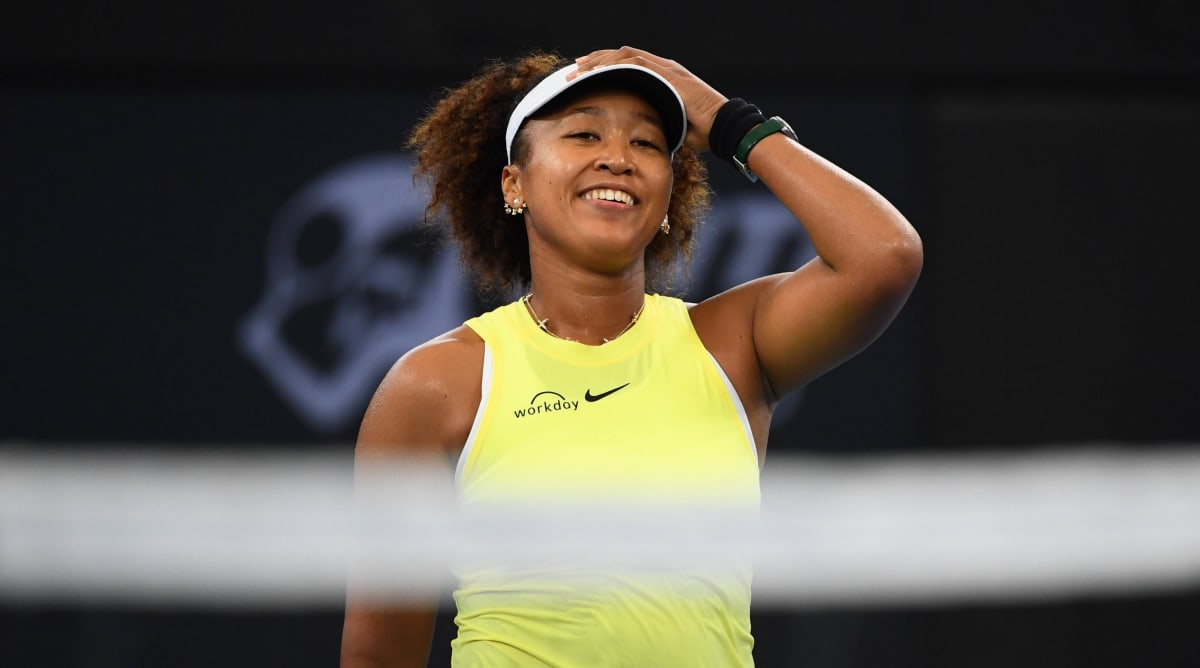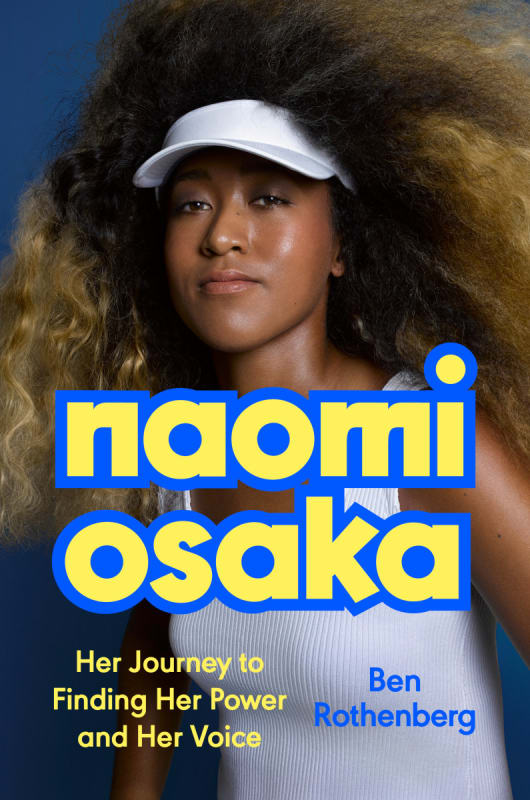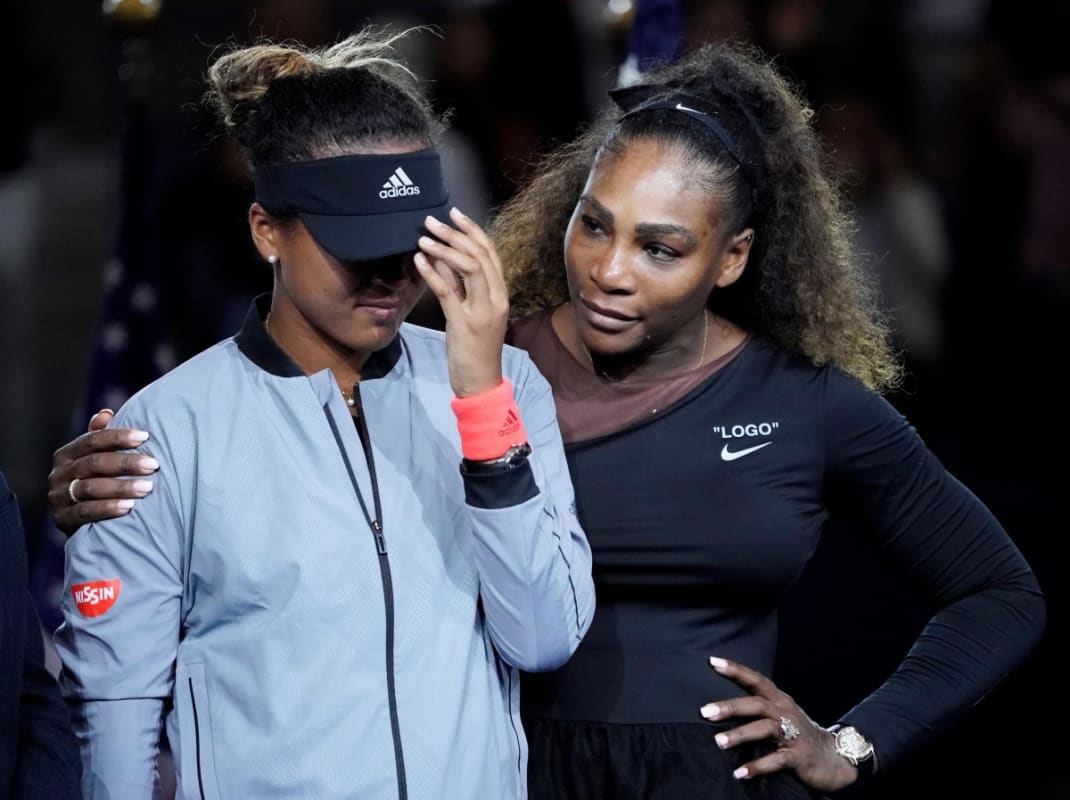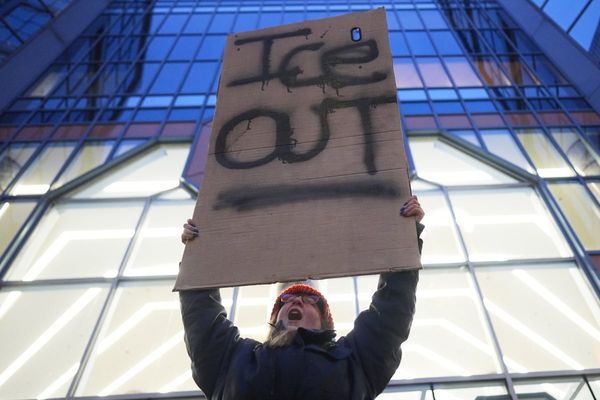Naomi Osaka is back.
After more than 15 months away from competition—which started with many thinking she was drifting away from the sport and ended with her becoming a first-time mother—Osaka has returned to the court. She made her official return at the start of 2024 in the Brisbane International, where she downed Tamara Korpatsch in the first round but lost in a hard-fought thriller to former world No. 1 Karolina Pliskova in the second round.
And this Sunday, Osaka will compete in the Australian Open, home to two of her four Grand Slam titles, facing No. 16 seed Caroline Garcia in the first round. Aptly timed with her return to a Slam for the first time since 2022, the first biography on the super star tennis player, Naomi Osaka: Her Journey to Finding Her Power and Her Voice, hit shelves on Jan. 9.

Jono Searle/IMAGO
Tennis writer Ben Rothenberg gets into Osaka’s story up until her maternity leave, beginning with when her parents met in Japan, started a family and then moved to the United States to focus on their daughters’ tennis careers, following the textbook laid out by Richard Williams. The book gets into Osaka’s relationship with her family, especially her sister Mari, her identity as a Black Japanese athlete, her struggles with finding her voice and then using it loudly during Black Lives Matter protests and again her struggles with her mental health. It goes deep into the unforgettable 2018 U.S. Open that thrusted her into the spotlight, leading up to the women’s singles title match against her idol, Serena Williams—and the aftermath that was more focused on Williams’s confrontation with the chair umpire for a series of rules violations than Osaka winning her first Grand Slam. The book also decodes what led to Osaka refusing to participate in press conferences at the 2021 French Open and her eventual withdrawal from the tournament.
Rothenberg got the idea to do the biography when Osaka—who has always been disarmingly charming in interviews with her awkwardness and polite demeanor—started speaking out against racism and inequality in the summer of 2020 following the murder of George Floyd. “It was striking to see that come from someone who I first met when she was a teenager and she was, by her own definition, super shy,” Rothenberg says.
Rothenberg didn’t realize then, though, that so much more was to come in Osaka’s story, including a public battle with her mental health, several injuries, major ventures in entrepreneurship and the birth of her daughter, Shai (a homonym for her once defining characteristic).
As Osaka gets back into her competitive groove, Rothenberg chatted with Sports Illustrated about his new book, Osaka’s journey thus far, her much-anticipated return and what we might expect to see in her second act.
This interview has been edited for length and clarity.
Sports Illustrated: How does one go about writing the Naomi Osaka biography?
Ben Rothenberg: I had the idea to write a book about something in tennis for awhile, and I’ve been covering the Tour for over a decade now. I had the idea to write about Naomi—I guess it was sort of brewing during the summer of 2020 when the Tour was stopped. She had this transformation across that summer, which was obviously a very profound time for a lot of people…She put herself out there during this Cincinnati tournament that was held in New York, when she forced a stoppage of play, following the NBA players lead in the bubble after the Jacob Blake shooting in Wisconsin. She was really the one person who stood up in tennis and forced it to stop. Seeing that sort of disruptive activism happen from someone who I had known to be so outwardly timid in a lot of her presentation outside of her toughness on the court….
I was really, really struck by that and I started looking into her backstory more and sort of exploring what might be there. There had not been much reporting at all on her early life really before the 2018 U.S. Open. Part of that was because she was lower ranked. She was also kind of between two countries because she was representing Japan but she was living in the U.S., so she wasn’t really totally on the radar in either of those markets.
Then what happened over the course of the next several months in terms of her winning another grand slam, and then having a stand up at the 2021 French Open and the whole mental health conversation around her and then also getting picked to light the torch at the Olympics in Tokyo at the opening ceremonies. There were all these sorts of things that made me really convinced like, “O.K. there has to be something that can work here.”

Courtesy of Penguin Random House
SI: Once you decided to do the book and were starting to work on it, what were you surprised to learn about her that maybe you hadn’t known from your time on tour?
BR: I think it was just about putting all these pieces together from her whole life and stepping back and seeing the through lines that happened—to seeing how the family’s really single-minded dream and really risky venture into betting everything on their daughters’ tennis careers and living this pretty isolated life in Florida, the homeschooling and just the sole-purpose, tunnel vision. Seeing how those things both gave her the strength and the skills and the resources inside herself to become the champion she is, but at the same time left her somewhat unprepared for a lot of the things that would happen to her as a tennis star.
And that’s the kind of thing we see with a lot of tennis stars, and other sports stars too, as you train your whole life to become a star and you’re not prepared to be a star. You’re very good at one part of it, but the other part you can’t really train for. So I think Naomi is a very stark example of that and a very intriguing example that can illuminate a lot of things for many other people, not just this sort of niche of being a top tennis player.
SI: The 2018 U.S. Open final against Serena Williams is such a monumental part of her story, but it’s also so nuanced. So when you were approaching that part of your book, what was most important to you in telling that part of the story?
BR: Yeah, that’s one of the toughest moments in her career that could have been its own book in itself. There was so much in the aftermath to have everyone in culture around the world, especially in the U.S., weighing in and having very strong opinions. This relatively specific set of rule violations in the tennis rulebook suddenly became this cultural debating point and people are on Fox News or The View—different ends of the spectrum—debating when coaching penalties should be called….
In terms of retelling it, it was interesting going back and rewatching it closely and transcribing all the sort of interactions between Serena and the chair umpire. Rewatching it I do think I was more sympathetic to Serena and her feelings than I was probably watching it live, and also with the benefit of having heard her talk about it after that and knowing more of what her feelings were at the time. Just seeing how important it was for her to be seen as someone following the rules and to have integrity in the sport, something that she in particular is especially sensitive to. Serena has had a lot of rule violations in her career famously. She broke lots of etiquette rules all the time and could live with that—and enjoy that at times, I think—in her career. But breaking a fairness rule really hit a nerve for her and she didn’t understand that. I mean, she did not think that her coach, Patrick Mouratoglou, had coached her. That’s what she says, there’s no reason not to believe her there. But he did, whether she saw it or not. So I now understood that she was in the dark and that she genuinely did not know what was happening. And that sort of clear misunderstanding where she thought she’d been wrongly called for this rule, that was very upsetting to her to be accused of this and it really entrenched everything that happened after in terms of her righteous outrage about the officiating going against her.
Live, I was thinking like, Man, Serena is really upstaging Naomi here. I think a lot of people thought that she was making this moment about her. But to understand why a particular button was pushed and why that set off a certain reaction inside Serena, I’d become more sympathetic and my thoughts on it had become more nuanced.
SI: What about Naomi’s side of it? What did you realize going back to how she responded both on the court and the media tour afterwards?
BR: I was most struck by how much of Naomi’s distress and emotions that day had to do with actually just beating Serena. Serena is someone she’s revered so much. She was so foundational to her life and really put her on the path she is on. It was her parents seeing the Williams sisters and chasing that blueprint and that dream that made Naomi have the entire life she has today. She really has idolized Serena and has continued to, still does, and that Naomi had to beat Serena and to stop Serena getting Grand Slam No. 24 was something that was really tough for Naomi. I think people don’t usually think that. If it was a Venus vs. Serena match, you might think of that emotion being complex. But for Naomi, it really was profound. During the match, Naomi was able to switch into competition mode and play a clear-minded and ruthless and flawless match. But she said once she went to Serena to hug her she felt like she was a kid again looking at Serena and it was tough for her. So I think that part of that story and why that was a factor in Naomi’s emotions was overlooked or discounted at the time.

Robert Deutsch-USA TODAY Sports
SI: Looking back on the 2021 French Open as a member of the media, what was your reaction to her not wanting to do pressers back then and what’s your view on it now with both the benefit of hindsight as well as the research you had to do?
BR: My immediate reaction in the moment I saw this come up was being surprised and confused because she had never previously expressed any discomfort really in terms of press conferences. She was known actually as being one of the best players in press conferences and really funny and open and quirky and charming. It was seen as a really rewarding format for her that she was very good at in a lot of ways.
But looking back at it and the benefit of hindsight and things she said since then, I think it was an accumulation of a lot of different stresses in her life. A lot of which was brought on by the Tokyo Olympics being a few months away and having won the previous two Grand Slams that she played and felt like expectations were super super high for her and that she looked at press conferences as being a stressor for her.…
She just looked at what was going on with everything and thought that the media stuff was something that she could opt out of, and sort of control. And it wound up completely backfiring because by trying to reduce the spotlight on herself a bit through this action, she completely magnified it exponentially at a time when she wasn’t actually the big talking point of that tournament. It became this huge cultural referendum and all sorts of celebrities and cultural commentators and everyone weighing in and having opinions on this rules dispute on if she could opt out of press conferences.
She has said that she regrets sort of how she handled that, but obviously one of starting a bigger conversation by talking about her mental health issues more explicitly than she ever had before. That really sort of changed the narrative. And that also resonated with a lot of people as well. That affected how people see her and saw themselves in terms of her, saying, “I’m No. 2 in the world but not enjoying this and not happy and don’t feel right, so I’m willing to withdraw from this Grand Slam tournament to take care of myself,” and that was very powerful for a lot of people.
SI: Now that she’s back from maternity leave, what do you think tennis fans and maybe even more sports fans in general can expect in her second act?
BR: I think her first signs were really, really good when she played in Brisbane. It was a complete unknown how she’d looked tennis-wise. We’ve seen some practice footage and I’d heard from her coach that she was doing really well, but you never know how it’s really gonna be until you actually get out on the court. She was hitting the ball incredibly well, as well as she ever has, honestly. Her fitness looked pretty good. I think she definitely exceeded expectations.
The tennis looks clean. It’s just a question of maintaining and continuing to improve the fitness and also the mental side. I think mentally she’s in a great place right now. But we know, especially from this book, that things can change quickly and can change for reasons that aren’t always immediately perceptible. So it’ll be interesting to see how she responds to both successes and setbacks this year. But I think the upside and the potential is very, very high. I think she can absolutely contend and be one of the best players in the world again, sometime this year—if not immediately this month in Australia, then definitely sometime later this year. She’s more experienced now and has a good team around her. Maybe it’ll be easier this time, but it’s still gonna be tough and it’ll be fascinating to see her grow and develop.







